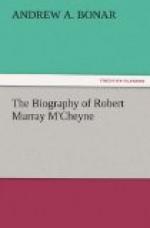His delight in preaching was very great. He himself used to say that he could scarcely ever resist an invitation to preach. And this did not arise from the natural excitement there is in commanding the attention of thousands; for he was equally ready to proclaim Christ to small country flocks. Nay, he was ready to travel far to visit and comfort even one soul. There was an occasion this year on which he rode far to give a cup of cold water to a disciple, and his remark was, “I observe how often Jesus went a long way for one soul, as for example the maniac, and the woman of Canaan.”
In February 1841, he visited Kelso and Jedburgh at the Communion season; and gladly complied with an invitation to Ancrum also, that he might witness the hand of the Lord. “Sweet are the spots,” he wrote, “where Immanuel has ever shown his glorious power in the conviction and conversion of sinners. The world loves to muse on the scenes where battles were fought and victories won. Should not we love the spots where our great Captain has won his amazing victories? Is not the conversion of a soul more worthy to be spoken of than the taking of Acre?” At Kelso, some will long remember his remarks in visiting a little girl, to whom he said, “Christ gives last knocks. When your heart becomes hard and careless, then fear lest Christ may have given a last knock.” At Jedburgh, the impression left was chiefly that there had been among them a man of peculiar holiness. Some felt, not so much his words, as his presence and holy solemnity, as if one spoke to them who was standing in the presence of God; and to others his prayers appeared like the breathings of one already within the veil.
I find him proposing to a minister who was going up to the General Assembly that year, “that the Assembly should draw out a Confession of Sin for all its ministers.” The state, also, of parishes under the direful influence of Moderatism, lay much upon his spirit. In his diary he writes: “Have been laying much to heart the absolute necessity laid upon the church of sending the gospel to our dead parishes, during the life of the present incumbents. It is confessed that many of our ministers do not preach the gospel—alas! because they know it not. Yet they have complete control over their own pulpits, and may never suffer the truth to be heard there during their whole incumbency. And yet our church consigns these parishes to their tender mercies for perhaps fifty years, without a sigh! Should not certain men be ordained as evangelists, with full power to preach in every pulpit of their district,—faithful, judicious, lively preachers, who may go from parish to parish, and thus carry life into many a dead corner?” This was a subject he often reverted to; and he eagerly held up the example of the Presbytery of Aberdeen, who made a proposal to this effect. From some of his later letters, it appears that he had sometimes seriously weighed the duty of giving up his fixed charge, if only the church would ordain him as an evangelist. So deep were his feelings on this matter, that a friend relates of him, that as they rode together through a parish where the pastor “clothed himself with the wool, but fed not the flock,” he knit his brow and raised his hand with vehemence as he spoke of the people left to perish under such a minister.




